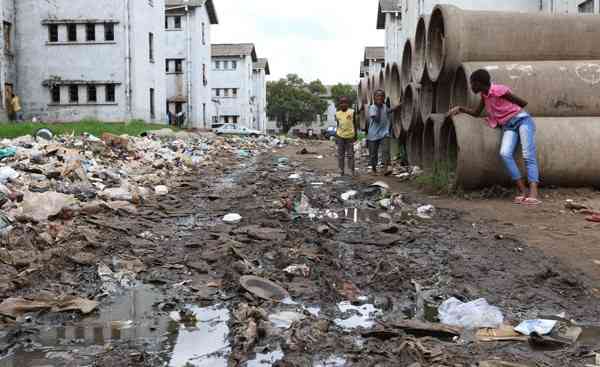
OVERCROWDING, poor water reticulation, obsolete sewer systems, uncollected refuse and old inhabitable homes is the story of Mbare.
It is also the story of Matapi Flats in the same suburb, built by council during the colonial era to accommodate local male workers to mitigate the big shortage of workers in the central business district.
It must have come as a relief when the country’s leadership made the suburb a centre piece of the second republic’s social development programme.
While campaigning ahead of the 2018 elections, Vice-President Constantino Chiwenga promised modern apartments with swimming pools.
“We have a comprehensive master plan for the home industries and the Mbare hostels to the extent that wherever we reconstruct a block of flats, there will be swimming pools for children and kindergartens,” Chiwenga said then.
“Mbare will be the first place that we are going to develop in Harare, and those that had relocated to Borrowdale and Mt Pleasant will come back to Mbare.”
The transformation, he said would start soon after the elections.
However, nothing has changed for the long-suffering residents, 43 years after independence. Government blames the opposition-led council, while council blames central government. And life goes on.
- Benzema confident Real will reach UCL final
- Rigging exposes widening Mnangagwa, Chiwenga rift
- Health talk: Mental health disorders and demolitions in Zimbabwe
- Munatsi family speaks on banker’s shock death
Keep Reading
While campaigning for the 2018 elections, President Emmerson Mnangagwa also toured the dilapidated flats in the suburb and promised to have them renovated.
He returned a year later and tried his hand at painting one of the flats, but rehabilitation work is yet to start, four years later.
Mbare, along with other low income neighbourhoods around the country, have been the epicentres of cholera and typhoid outbreaks over the past decade.
This week, two ministers, Daniel Garwe (National Housing) and Sekai Nzenza (Industry) toured the suburb and swimming pools were not on their agenda.
“We will destroy these houses and build new ones with proper and working sewer systems. This place has over 3 000 people, but they are using the same toilet. The pipes can no longer service such a populace,” Garwe told the unimpressed residents.
They have heard it all.
With elections expected in August this year, Garwe again sought to blame the opposition-run Harare City Council.
“People are being forced to pay sewer bills by the council but no services have been done. The council is also making people pay garbage collection fees but there is litter everywhere.”
Garwe, who is also the Local Government acting minister, said Mbare houses were no longer habitable.
But Mbare is also a political chessboard for the warring political parties.
In 2011, a Bill and Melinda Gates Foundation-funded project to rehabilitate the Matapi Flats in Mbare failed to take off after the Zanu PF-linked Chipangano terror group blocked the programme.
“There is a political element in trying to sort out the mess in the Mbare hostels because you are just running to a big hole in politics. There are very powerful political blocks, vigorous and can block you physically from doing anything. We can remodel Mbare, renew it and create an urban renewal programme that will allow people to live in dignity. We have got the ideas,” mayor Jacob Mafume told NewsDay Weekender last year.
The Matapi flats have been reduced to drug dens and brothels in some cases.
Over 200 families are forced to share one toilet and share communal baths most of which are broken down and pose serious health risks for those who use them.
The absence of running and potable water makes it even worse and residents rely on unsafe water sources for their daily survival.
Swimming pools? Mbare residents could do with accommodation that offers some kind of privacy.










